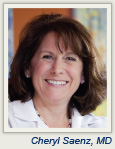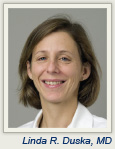The National Cancer Institute recognized Cheryl Saenz, MD, and Linda R. Duska, MD, among others, late last year with a Cancer Clinical Investigator Team Leadership Award. The 2-year award includes $50,000 in funding for cancer research programs at NCI-designated cancer centers. The ASCO Post recently talked with Dr. Saenz and Dr. Duska about their work and how their respective grants are helping to further their research goals in gynecologic oncology.
Cheryl Saenz, MD
 What appealed most to Cheryl Saenz, MD, about specializing in gynecologic oncology was the opportunity it gave her to offer her patients comprehensive care. “When I first rotated on the gynecologic oncology service, it was the most all-encompassing field in oncology because as gynecologic oncologists we operate on our patients, prescribe chemotherapy, and work with the radiation oncologists to treat our patients,” says Dr. Saenz. “It allowed me to take care of my patient from the time of her cancer diagnosis until her cure or end of life. And that’s not really available in any of the other oncology specialties.”
What appealed most to Cheryl Saenz, MD, about specializing in gynecologic oncology was the opportunity it gave her to offer her patients comprehensive care. “When I first rotated on the gynecologic oncology service, it was the most all-encompassing field in oncology because as gynecologic oncologists we operate on our patients, prescribe chemotherapy, and work with the radiation oncologists to treat our patients,” says Dr. Saenz. “It allowed me to take care of my patient from the time of her cancer diagnosis until her cure or end of life. And that’s not really available in any of the other oncology specialties.”
Now Clinical Professor of Gynecologic Oncology at the University of California, San Diego, School of Medicine, Dr. Saenz focuses on educating women about the prevention of gynecologic cancers and being a facilitator between researchers and clinicians to enable patients to get the most effective treatments for their cancer.
Counseling Patients
One of your areas of interest is the prevention of gynecologic cancers. How do you educate women about their risk for cervical, uterine, and ovarian cancers?
Dr. Saenz: Each of those malignancies has different risks associated with it. Some risks are hereditary, while others are environmental. With all of these cancers, however, what’s incredibly important is to take a thorough family history, particularly at the patient’s first visit but then at follow-up visits as well, because family history is very dynamic, especially when you have a patient for years and other members of her family are diagnosed with other malignancies in the interim. And from that information, you can start to put together a picture of a patient’s family history and what her individual risk factors may be.
When we talk about a woman with endometrial cancer, it’s important that we not only talk about her family history of ovarian and endometrial cancers and perhaps breast cancer, but colon cancer as well, because colon cancer and endometrial cancer are genetically linked. That’s one of the ways that we focus on prevention. We also focus on preventing environmental malignancies, particularly cervical cancer—which is related to the human papillomavirus (HPV)—especially now that there is a vaccine available to help prevent HPV-driven malignancies. We educate patients about their risk of exposure to HPV and help them discuss the risks with family members.
Research-Clinic Bridge
Presently you are not directly involved in clinical trial research. Why were you a recipient of the NCI Cancer Clinical Investigator Team Leadership Award?
Dr. Saenz: Although I have not been in the laboratory for several years, the NCI grant was given to me so I could continue acting as a facilitator or as a bridge between the basic and translational research going on here and the clinical activities of the gynecologic cancer service we provide at UC San Diego. For example, when clinicians see patients they may not always be thinking of the latest research and whether some of their clinical questions could be answered in the laboratory. Conversely, researchers may not always be aware of what we’re seeing clinically. Attending meetings with the researchers allows me to bring them relevant clinical findings.
We are also one of the sites for the Oncofertility Consortium, an NIH-funded program, which looks at fertility preservation in women undergoing cancer treatment. As part of the consortium, we actually identify young women who may be at risk for infertility and offer them the opportunity to have one of their ovaries removed and frozen for their potential later use in harvesting eggs for in vitro fertilization.
When I heard that the program was ongoing, I volunteered to be the surgeon on the protocol. Once we identify an eligible patient, I get the woman into the operating room within 5 to 7 days after diagnosis so that she doesn’t have any subsequent delay in her cancer treatment.
So I see myself as someone with a foot in each arena. Having worked in a molecular biology laboratory for many years and now as a clinician, I have a much greater appreciation for those two areas. As a result, I’m able to bring the two fields together.
Inroads of Success
In the future, will it be possible to cure gynecologic cancers or is turning them into chronic diseases the best we can hope for?
Dr. Saenz: Of course, my hope is that we could cure these diseases. On the other hand, if we could extend patients’ overall survival, that in itself would be a success. That’s what we have done reasonably well with ovarian cancer. As much as people see ovarian cancer as a horrible disease—and so it is, with 50% of women diagnosed with ovarian cancer dying from the disease—the truth is that we have achieved a long overall survival rate in this population, more so than in patients with a diagnosis of stage III or IV gastric or colon cancer. The greatest inroads of success in ovarian cancer have been in prolonging disease-free intervals.
Linda R. Duska, MD
 The combination of a better understanding of the molecular and cellular basis of cancer and the near completion of the human genome project is working to turn gynecologic cancers, such as ovarian cancer, into chronic diseases. Finding more effective targeted treatments that allow patients to maintain a high quality of life is the goal of Linda R. Duska, MD, Associate Professor of Obstetrics and Gynecology and the Gynecologic Oncology Fellowship Director at the University of Virginia (UVA) in Charlottesville.
The combination of a better understanding of the molecular and cellular basis of cancer and the near completion of the human genome project is working to turn gynecologic cancers, such as ovarian cancer, into chronic diseases. Finding more effective targeted treatments that allow patients to maintain a high quality of life is the goal of Linda R. Duska, MD, Associate Professor of Obstetrics and Gynecology and the Gynecologic Oncology Fellowship Director at the University of Virginia (UVA) in Charlottesville.
To achieve that goal, Dr. Duska is helping build the clinical trial program in gynecology/oncology at UVA, including NCI-initiated group trials and investigator-initiated trials. One of these trials is an investigator-initiated phase 0 trial in patients with endometrial cancer. Phase 0 trials use pharmacodynamic biomarker assays to evaluate whether a new agent is hitting its intended molecular target.
Translational Research
How is your research resulting in more effective treatments for gynecologic cancers?
Dr. Duska: A lot of our clinical work includes translational studies intended to help us learn more about gynecologic cancers and biologic treatment effect. In collaboration with my colleagues, Drs. Sally Parsons, Paula Fracasso, and Gina Petroni, we are currently developing a phase 0 study in endometrial cancer. I am very grateful for the scientific, biostatistical, and clinical trial design expertise available at UVA for collaborations in developing a complex trial such as this one. In this trial, we will give a biologic drug to patients prior to hysterectomy and then look at both their endometrial cancer tissue and blood samples to see if the drug is targeting what we think it’s targeting in the endometrial cancer tissue. We’ll also see if we can measure the drug in tumor tissue and correlate this measurement with serum levels.
 In addition, with my collaborators Drs. Jill Slack-Davis and Jennifer Scalici, we’re conducting a pilot study investigating VCAM, a new potential marker for ovarian cancer in serum. VCAM is measurable in serum but also lights up in the peritoneum of patients with advanced ovarian cancer, and we’re looking at the VCAM response to chemotherapy in the peritoneum and in the blood.
In addition, with my collaborators Drs. Jill Slack-Davis and Jennifer Scalici, we’re conducting a pilot study investigating VCAM, a new potential marker for ovarian cancer in serum. VCAM is measurable in serum but also lights up in the peritoneum of patients with advanced ovarian cancer, and we’re looking at the VCAM response to chemotherapy in the peritoneum and in the blood.
Another one of our scientists, Jae Lee, PhD, has developed the COXEN algorithm, which predicts drug sensitivity based on gene-expression analysis. The algorithm was originally developed to predict chemosensitivity for bladder cancer, but we’re translating it for use in recurrent ovarian cancer in a phase II prospective design.
Based on your research findings, will new treatments for gynecologic cancers be available in the clinic soon?
Dr. Duska: I’m very optimistic about that. We’ve made so much progress in our understanding of cancer biology and genetics, and we’re just sitting at the edge of breakthroughs now, but there’s so much more to learn. Clinicians like me need to work more closely with the basic scientists to develop better therapies, so ultimately we’re able to individualize cancer care.
NCI Grant
How will the NCI award help further your work?
Dr. Duska: My job isn’t just focused on the clinical trial program. I’m a practicing gynecologic oncologist, and I perform complex gynecologic cancer surgeries as well as administer chemotherapy for my patients. I’m also the Fellowship Director for Gynecologic Oncology, and in that role, I see my job as training not only excellent clinicians but also future clinical trialists in the advancement of care for gynecologic cancers. So far, I’ve had the opportunity to mentor two of my fellows in designing and implementing their own clinical trials.
The NCI award will allow me to build on both our internal relationships with clinical investigators and basic scientists here at UVA and our external relationships with other cancer centers to launch clinical trials. The UVA Cancer Center has been supportive to me in this regard, from both a mentoring and a financial standpoint, and has allowed me to carve out time to carry out this work. The NCI grant, which UVA is matching, is going to give me the support I need to achieve those goals. In addition to the support for my salary, the UVA Cancer Center has been instrumental in supporting my investigator-initiated trials. Without the Cancer Center’s support, I would not be able to do these studies.
Chronic Illness vs Cure
With the progress being made in the understanding of the molecular pathogenesis of gynecologic cancers, do you think these cancers can be turned into chronic illnesses, or will it be possible to cure them?
Dr. Duska: That’s a good question. In the case of ovarian cancer, right now for many patients with advanced disease we are able to achieve a “chronic disease” state, which is much better than where we were 10 years ago. Cure is the ultimate goal but living longer and living well with disease is an integral step in this process. We also have to focus more on quality-of-life issues and develop treatments that are not so toxic. I definitely think we’re making progress. ■
Disclosure: Dr. Saenz and Dr. Duska reported no potential conflicts of interest.

